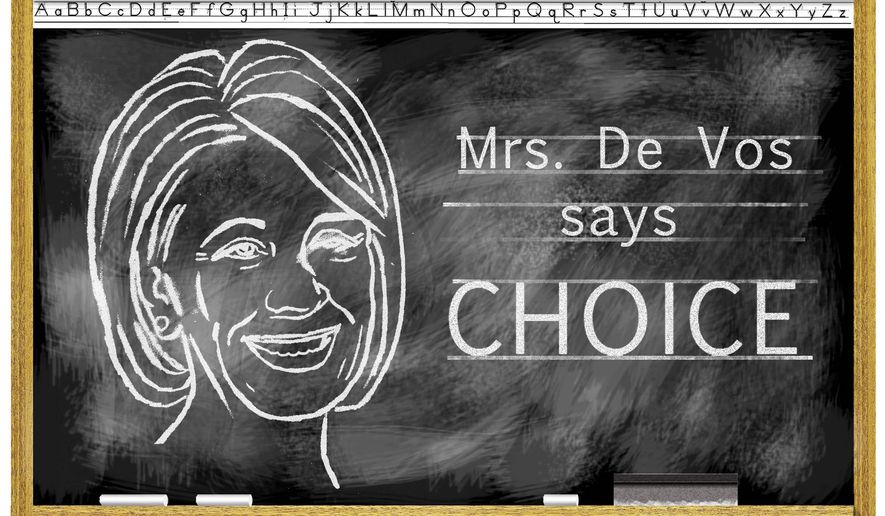OPINION:
Other than maybe the highly voluble William Bennett, Ronald Reagan’s second education chief (who still has a radio show), it is difficult to think of a U.S. Secretary of Education who has garnered as much attention as Betsy DeVos. But not in a good way. As exemplified by her much-lambasted interview on “60 Minutes” recently, from basically the day her nomination was announced she has been condemned as dangerous and unprepared for the job.
And it can be difficult to disagree with the latter. Perhaps, that is, unless you think the job should not exist.
Would it be useful for advancing the things Mrs. DeVos seems to stand for — more choice and less federal interference — if she could articulately and forcefully defend them? Absolutely, and in this regard Mrs. DeVos leaves much to be desired. She is not as utterly bumbling as many of her most vociferous — and perhaps politicized — detractors proclaim, but she needs to have clear, forceful answers ready. Alas, she too often doesn’t.
For instance, Mrs. DeVos was right to point out in her “60 Minutes” interview that research in Florida has found that the presence of private school-choice programs appears to drive public schools to improve, but she needed to know what to say when challenged on the effect of choice in Michigan. There, research has shown that choice in the form of charter schools works, but it is arguably the least friendly state to private school choice — its constitution is the only one to specifically prohibit even tax credits for choice — and we should all recognize that schools only have so much impact on test scores. Lots of other factors do, too.
That said, if you believe that the federal government should have little if any role in education — if you’ve read the U.S. Constitution and know that governing in education is not among its few and only powers — then something might actually seem a bit right about Mrs. DeVos’ somewhat humble, tentative approach to pronouncing on policy. Again, if her position is that Washington should not be involved in education she should state that with conviction, citation of the Constitution, and immediate reference to evidence of federal failure. But there is also something refreshing about a bit of humility.
Even believers in a strong federal role in education will admit that Washington only supplies around 10 percent of total K-12 funding. Isn’t it then a bit much to have an education secretary pronouncing that he or she knows best what all children need? And isn’t it even worse when they end up dictating to the country’s schools in exchange for that relatively small pot of money the feds supply?
For people who think that Washington should have appreciable control over education, it is, of course, easy to understand their worry about an education secretary who doesn’t seem to have total command over all the issues. If government is to run education, you’d better have a brilliant person running government.
But that model seems to have produced pretty weak results. Mrs. DeVos was right to point out in her pilloried interview that we’ve seen test-score stagnation, at least as measured by high school seniors, in the decades of increasing federal control. And with the Every Student Succeeds Act, passed in late 2015, Congress rejected federal control as delivered through the No Child Left Behind Act, Race to the Top, and as symbolized by the federally coerced Common Core national curriculum standards.
Why did Congress reject federal education management? Not just because it did not appear to work, but because the American people rejected it. They were exhausted by Washington’s masters of the universe — or of the classroom — telling them what education was all about, whether their schools were any good, and imposing policies under the constant threat of withholding money taxpayers had no choice but to send to D.C.
In a way, Mrs. DeVos represents what the public seems to want, and the Constitution, at a minimum, demands: a humble, hands-off Washington.
• Neal McCluskey is director of the Cato Institute’s Center for Educational Freedom.




Please read our comment policy before commenting.